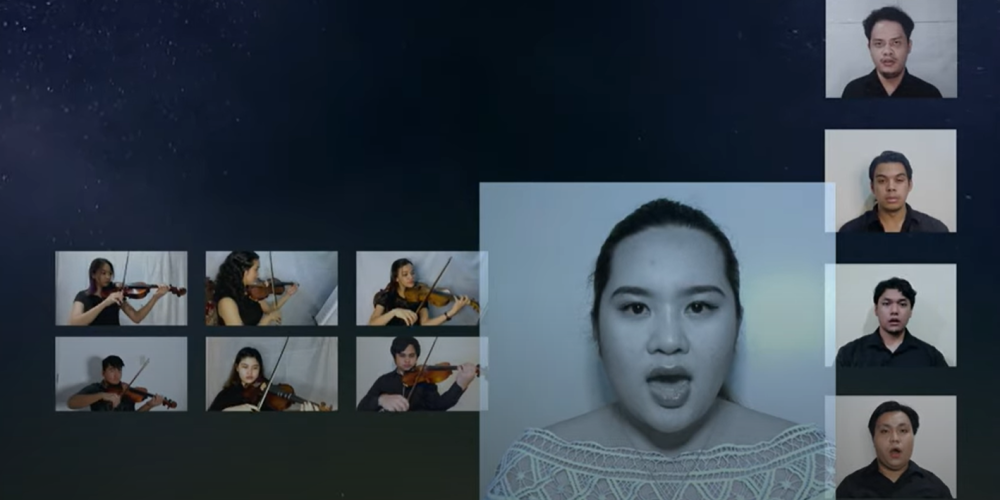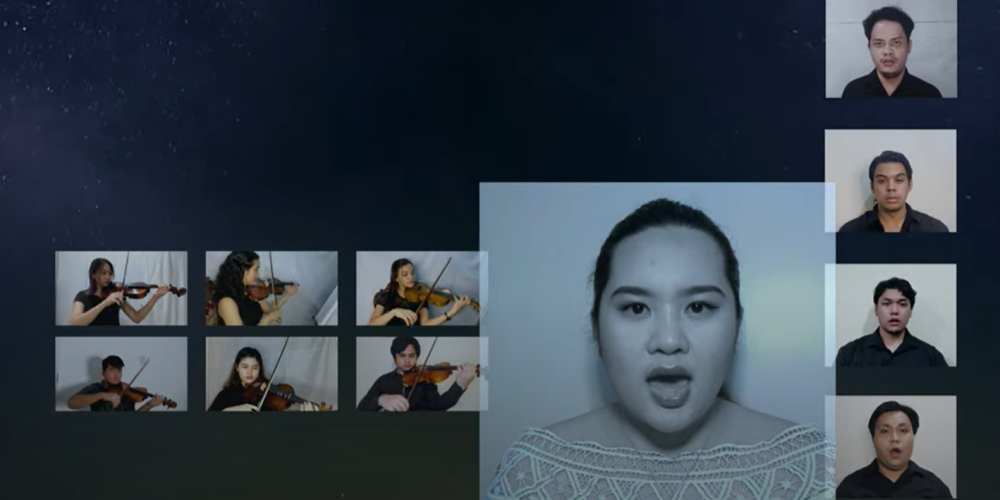Serenading a Troubled Ocean
This article is part of a series of pieces on environmental topics that Physics is publishing to celebrate Earth Day (April 22). See also: Research News: Breaking Barriers to Polymer Recycling; Opinion: Renewable Energy’s Intermittency is Not a Showstopper; News Feature: The Answer is Blowing in the Turbine; Q&A: The Lure of Cement.
Growing up in a poor community in the Philippines’ capital of Manila, Dennis Gupa was only too familiar with the increasingly destructive effect of typhoons. Back then, he didn’t know that climate change can exacerbate typhoons and other extreme weather events. But when one of the most powerful tropical cyclones ever recorded struck his home nation while he was studying theater abroad, Gupa was forced to reckon with the science behind these destructive events. Now, he forges dialogue about climate change through applied theater, a medium that combines diverse performative elements to provoke social change. His latest work fuses traditional Filipino poetry with choral composition.
Gupa had long been drawn to the idea of using theater as a science education tool in poor urban communities. One of his first projects at the University of the Philippines Los Baños (UPLB) was a collaboration with a nutritionist that culminated in a theater production about heritage food. “I thought of her lab as a stage! That was the beginning of my mission to bridge science and theatre,” says Gupa.
In 2013, Gupa moved to Canada to pursue graduate work at the University of British Columbia in Vancouver. In November of that year, Typhoon Haiyan devastated the Philippines. “It was an existential crisis for me,” Gupa says. “What am I doing studying art in Canada while there is so much suffering in the Philippines?” He then began to incorporate disaster study, climate change, and indigenous ecological knowledge into his theater projects.
In 2021, Gupa became the Artist-in-Residence at Ocean Networks Canada (ONC), a University of Victoria initiative that gathers oceanographic data about Canadian Pacific, Arctic, and Atlantic waters. “We’re in the midst of an existential crisis for ocean health,” says ONC Chief Scientist Kim Juniper. “Science alone is not going to fix this. We need broader societal engagement.” The residency program provides a four-month stipend for artists to create work representing ONC research. Gupa became the program’s second resident. “Gupa brought his long-term view of how climate change impacts people who are dependent on the ocean,” Juniper says.
During his residency, Gupa produced a series of musical compositions based on the Filipino poetic form tanaga. These four-lined poems follow a strict syllabic structure and are centered around an ecological theme. They express love and commitment but always use metaphors for water and trees to create what Gupa describes as a short-form “love letter.” Together with Filipina poet Karla Comanda and a panel of composers, singers, and musicians, Gupa created a musical performance called Gossip with Whales. Based on four tanaga poems, the piece walks the audience through issues that impact the ocean.
In one of the tanagas, Comanda’s lyrics capture how marine heat waves impact corals. The corals become stressed by heat and acidification, which causes them to part ways with their algae and ultimately starve: “Today I heard the corals crawl // Calling for food // So the sea witches warmed them up // With funeral fluff made of sunlight.” The concluding tanaga is a call to action, evoking images of coastal communities in distress: “Soon we’ll walk on water // on bamboo stilts // held together by crocodiles // eating from our mouths.”
Composer Darren Vega set the poems to music, and Gupa arranged for soloists Thai Hoa Le, Jeremiah Carag, and Jackielyn Sentinerial to perform with the UPLB Choral Ensemble and Harmonya String Ensemble, both under the direction of Roijin Suarez. Because of COVID-19 restrictions, each individual voice and instrumental performance was recorded separately on mobile phones, then all recordings were combined into a seamless group performance through postproduction. In September and November of last year, ONC and the University of Victoria presented Gupa’s work in an online public lecture, streamed on a background of underwater images taken during ONC expeditions at sea.
Now an assistant professor at the University of Winnipeg in Canada, where theater students are required to study climate change through the liberal arts program, Gupa continues to use theater as a tool for promoting dialogue about climate and ocean science. Next year, he plans to host a conference to engage policy makers, artists, and community members to focus on how to rebuild communities devastated by extreme weather events.
ONC User Engagement Director Dwight Owens says that the Artist-in-Residence program has led to other art and science collaborations, including a festival raising awareness about ocean plastics pollution in Mombasa, Kenya, and a virtual art gallery exhibition coinciding with the November 2021 COP26 summit. Eventually, ONC aims to establish more transdisciplinary research with the goal of “engaging people from all different disciplines to better communicate the importance of and threats to oceans,” Owens says.
–Rachel Berkowitz
Rachel Berkowitz is a Corresponding Editor for Physics Magazine based in Vancouver, Canada.





